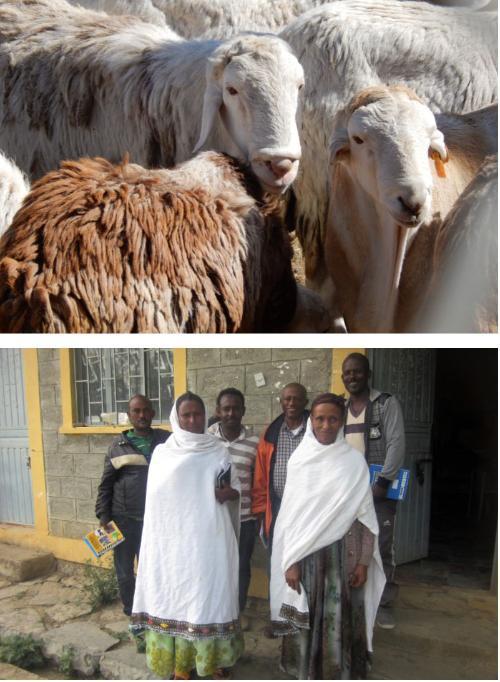Project in Ethiopia
The Effect of Passive Surveillance Training on Animal Health Parameters, Northern Ethiopia
Timeframe: October 2016 - April 2018
Funding: USAID
Principal investigator (PI) and lead institution
Corrie Brown, University of Georgia
Co-PI and collaborator institutions
- Foreign Animal Disease Diagnostic Laboratory (FADDL-VS-APHIS-USDA)
- Mekelle University
Results
- Results Summary. May 2020. The effect of passive surveillance training on animal health parameters, Northern Ethiopia
- Innovation Summary of Disease Detection
Field Manual of Animal Diseases in 4 Languages
The Ethiopian Office of the Food and Agriculture Organization of the United Nations partnered with the Ethiopian Ministry of Agriculture to translate the field manual originally developed by Dr. Brown into major local languages: Amharic, Oromifa, and Tigrinha.
- A Field Manual of Animal Diseases by Syndromes (English): With an Emphasis on Transboundary Animal Diseases
- A Field Manual of Animal Diseases by Syndromes (Amharic language): With an Emphasis on Transboundary Animal Diseases
- A Field Manual of Animal Diseases by Syndromes (Oromiffa language): With an Emphasis on Transboundary Animal Diseases
- A Field Manual of Animal Diseases by Syndromes (Tigrigna language): With an Emphasis on Transboundary Animal Diseases
Project Plan
 This project conducted a proof-of-concept research activity involving enhancement of awareness regarding recognition, reporting, and treatment of public and private good animal diseases. Objectives of the project were to: (1) Measure reporting of public good diseases before and after training, to determine if producer involvement sufficiently enhances awareness and reporting of diseases for which the government is tasked with controlling; (2) Identify perceived barriers to reporting among producers through discussion sessions at workshops delivered; (3) Determine the impact of trainings on the distinction of private good and public good diseases, for more effectively addressing and growing each of these two animal health sectors; (4) Measure the engagement of private practitioners in livestock disease control (both TADs [Transboundary Diseases] and LPDs [Livestock Production Diseases]); (5) Measure owner/producer income levels before and after training to determine if private good diseases can be managed effectively and economically by the private/commercial sector.
This project conducted a proof-of-concept research activity involving enhancement of awareness regarding recognition, reporting, and treatment of public and private good animal diseases. Objectives of the project were to: (1) Measure reporting of public good diseases before and after training, to determine if producer involvement sufficiently enhances awareness and reporting of diseases for which the government is tasked with controlling; (2) Identify perceived barriers to reporting among producers through discussion sessions at workshops delivered; (3) Determine the impact of trainings on the distinction of private good and public good diseases, for more effectively addressing and growing each of these two animal health sectors; (4) Measure the engagement of private practitioners in livestock disease control (both TADs [Transboundary Diseases] and LPDs [Livestock Production Diseases]); (5) Measure owner/producer income levels before and after training to determine if private good diseases can be managed effectively and economically by the private/commercial sector.
Activities will encompass 15 Woredas in the Region of Tigray, a region that is representative of the proportions of livestock but has overall lower productivity compared to the rest of the country, and therefore has potential for great impact. In all, workshops and training for 450 producers will be held, together with approximately 90 public and private veterinarians, to create a network of understanding regarding the importance of recognition of and reporting on transboundary animal diseases (TADs - public good diseases, responsibility of government for control), and the recognition and potential therapeutics for the endemic Livestock Production Diseases (LPDs – private good diseases, responsibility of owner for control). Results will inform future efforts for training in enhancing control of livestock diseases, a key parameter in food security and economic viability.
More Information
 October 2020 research update BROWN VGM (Virtual General Meeting)
October 2020 research update BROWN VGM (Virtual General Meeting)
- Project leaflet: The Effect of Passive Surveillance Training on Animal Health Parameters, Northern Ethiopia
Photo credit: C. Brown
Feed the Future Innovation Lab for Livestock Systems is part of Feed the Future





